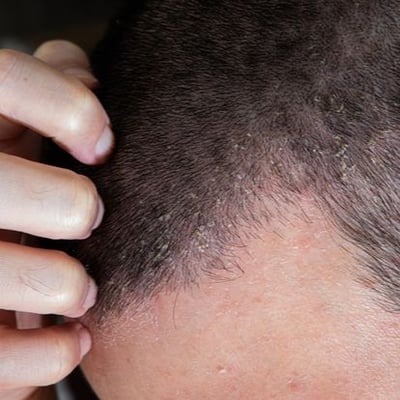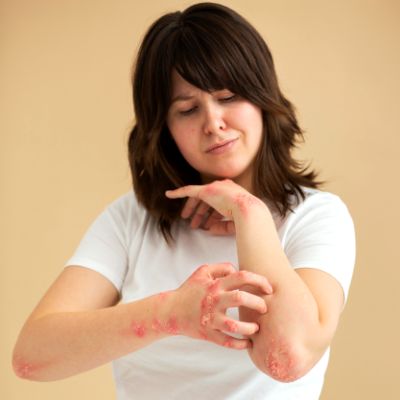Scalp eczema affects 4% of the adult population and is more common in men than women. The prevalence of this condition rises sharply with a peak at 30 years for men and 40 years for women. If you are suffering from this condition, then your frustration has come to an end because we are presenting the best eczema treatment in Abu Dhabi to restore the balance of your hair kingdom. So, continue further because relief is just a click away!
Quick Facts:
- Cost: Affordable
- Results: Long lasting
- Downtime: Minimal
- Back to Work: Immediately
- Duration of Treatment: Varies
- Type of Procedure: Nonsurgical
Table of Content
Scalp Eczema:
Eczema is an umbrella term for multiple skin conditions that cause irritation, itching, or skin flaring. It not only affects the visible parts of the body but also ruins our scalp in multiple ways. Scalp eczema is uncontrollable and it causes embarrassment with noticeable flakes in the hair. It is not contagious but requires appropriate care because it is persistent. Seeking medical guidance is crucial for the sufferers.
Causes:
Malassezia Yeast which is naturally presented leads to irritation.
- Genetic factors like people with a family history of eczema
- factors like dry weather or excessive heat.
- Stress and anxiety can also flare up existing symptoms.
- Changes in hormone levels further promote eczema
Symptoms:
- Itching
- Redness
- Flaking
- Burning
- Hair loss
Categories of Eczema:
This condition is classified into the following kinds:
- Seborrheic dermatitis:
- Atopic eczema:
- Allergic contact dermatitis:
- Irritant contact dermatitis:
Treatments for Scalp Eczema:
Following are the treatment procedures at Enfield Royal Clinic:
Medicated Shampoos:
The first thing to cure eczema is medicated shampoos. These shampoos contain active ingredients like ketoconazole, coal tar, selenium sulfide, or salicylic acid. They help to reduce inflammation, control yeast growth, and alleviate itching.
Topical Corticosteroids:
These medications are recommended by the dermatologist for severe cases of eczema. They control the condition by suppressing the immune response in the affected area. Corticosteroids come in various forms including creams, ointments, and solutions.
Antifungal creams:
These creams typically contain active ingredients like clotrimazole or miconazole. Antifungals are recommended because yeast overgrowth contributes to eczema and these creams control fungal growth.
Phototherapy:
Phototherapy is recommended in severe cases of eczema which does not get treated with any other treatment. This treatment involves exposing the affected area to specific wavelengths of light. This wavelength reduces inflammation and it is performed under the supervision of an expert.
Oral Medications:
For persistent cases of scalp eczema, oral medications are prescribed. These include oral corticosteroids, antifungal pills, or immunosuppressants. These medications work internally to suppress the immune response, reduce inflammation, and control yeast growth.
Lifestyle Changes for Prevention:
Some daily routine tips to prevent and manage eczema are:
- Keep your scalp hydrated.
- Avoid triggers like stress and dry weather.
- Maintain a balanced diet enriched in fruits.
- Drink an adequate amount of water.
- Often consult a dermatologist.
Eczema vs Dandruff:
While dandruff and scalp eczema both have comparable symptoms, such as flaking and itching. Scalp eczema is an inflammatory skin condition, whereas dandruff is frequently obtained by an excess of oil production and yeast.
Say goodbye to your scalp worries!
If you are tired from the frustrations of your scalp eczema then book an appointment with us now to regain relief. Your journey is just a single step away. Fill ou the consultation form and get started!
FAQ’s:
Does it affect other body parts?
Yes, scalp eczema may extend to the face, ear, and neck.
When should I make an appointment with the doctor?
Make an appointment immediately after noting eczema conditions in your scalp to prevent its spread.
When can I see the treatment results?
The time to notice improvements varies according to the effectiveness of the procedure.
Is it permissible to color my hair while experiencing this condition?
It is essential to consult with a dermatologist before dying your hair.










 Start
Start